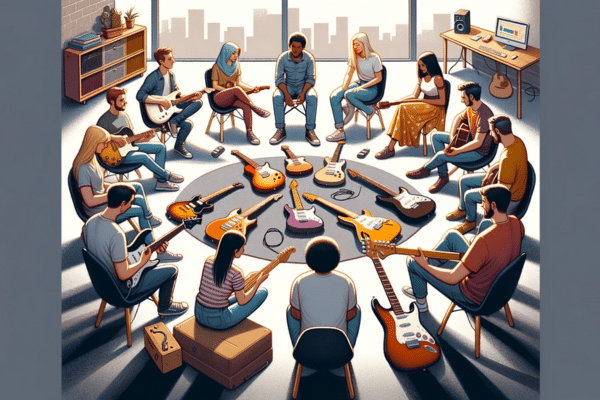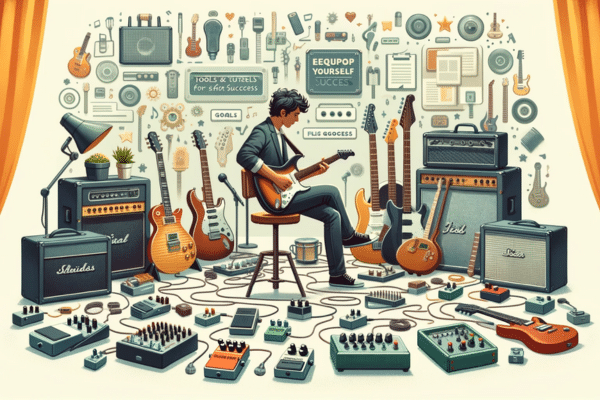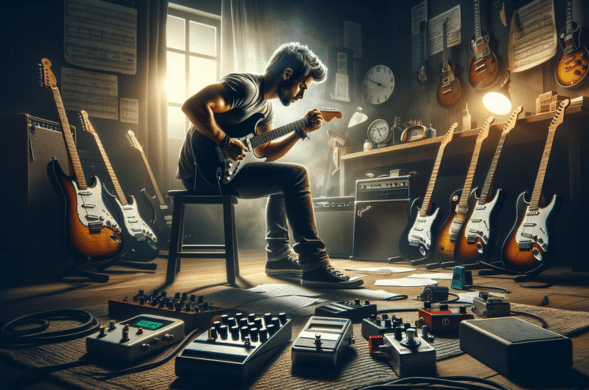Are you feeling stuck in your guitar journey, wondering how to push past the frustration of not making progress? You’re not alone! In this comprehensive guide, we delve into the strategies and insights on how to overcome guitar playing plateaus, offering you a roadmap to reignite your passion and elevate your skills.
This article is a treasure trove of practical tips, expert advice, and motivational strategies designed to help you break free from stagnation and achieve new heights in your guitar playing.
Let’s dive in and discover how you can turn your plateau into a stepping stone towards guitar mastery!
The Short Answer
To effectively overcome guitar playing plateaus, focus on diversifying your practice routine, setting achievable goals, and seeking feedback. Exploring new musical genres and techniques can reinvigorate your passion and skill development. Additionally, engaging with the guitar community for inspiration and guidance, as well as leveraging recording and self-analysis, are key to breaking through these stagnation periods.
Key Takeaways

Here are ten essential things that can help you overcome a Guitar Playing Plateau.
- Embrace Plateaus as Opportunities: View each plateau as a chance to reassess your approach and discover new methods to enhance your playing.
- Incorporate Regular Feedback: Regularly seek feedback from peers, mentors, or instructors to gain new perspectives and guidance on your playing.
- Engage in Deliberate Practice: Focus on the quality of your practice sessions by setting specific goals and working on challenging aspects of your playing.
- Explore Music Theory: Deepen your understanding of music theory to add depth to your playing and break through technical limitations.
- Experiment with Different Guitar Setups: Changing your guitar setup, such as string gauges or action, can offer new challenges and stimulate learning.
- Use Technology to Aid Learning: Utilize guitar learning apps, online tutorials, and recording software to diversify your practice routine and track progress.
- Physical and Mental Well-being: Maintain physical health through exercises for hand strength and dexterity, and ensure mental well-being to stay motivated.
- Join Guitar Workshops or Clinics: Participate in workshops or clinics to learn new techniques and get inspired by other guitarists’ experiences.
- Understand the Role of Gear: Recognize how different effects pedals, amps, and guitar types can influence your sound and inspire new playing styles.
- Record and Analyze Your Performances: Regularly recording and critically analyzing your performances can reveal subtle areas for improvement and track progress over time.
Keep On Reading (Below) To Learn More
Understanding and Overcoming the Guitar Plateau

If you play guitar, you’ve likely hit a plateau before – the point where hours of strumming and picking no longer translate into noticeable improvements. It’s common and even expected, but it can be incredibly frustrating.
The guitar plateau has a significant impact on learning, acting as a barrier to progress. Realizing that plateaus are a natural part of the learning curve is crucial – they signal that it’s time to reassess and refine your approach.
The Importance of Practice
Practicing consistently is at the heart of overcoming these stagnant periods. I’ve found that even dedicating a mere 15-20 minutes daily can lead to steady improvement. It’s not just about the quantity of time, though. Quality matters, too, and even more so than quantity!
Focusing on Quality Over Quantity
When I sit down to practice, my goal isn’t to mindlessly repeat what I already know. I zoom in on what needs work. Often, that means recording my sessions; it’s eye-opening to hear the playback and pinpoint exactly where I stumble.
Setting Purpose-Driven Goals
I’ve learned that practice should be purpose-driven. To effectively break through plateaus, define what you want to achieve each session. And remember, setting small goals makes the journey more manageable and fulfilling.
Don’t get discouraged by the roadblocks. Instead, use them as reminders to refocus and set a structured, goal-oriented practice routine. Doing this regularly is like adding rungs to your ladder – helping you climb higher, one step at a time.
Practice Routine Schedule Table
Here is an example of a weekly schedule you can use to improve in a variety of areas. The key is consistency! Please feel free to custom-design a schedule that works best for you.
| Day | Technique Practice | Music Theory | Genre Exploration | Song Practice | Total Practice Time |
|---|---|---|---|---|---|
| Monday | 30 min | 15 min | Rest | 30 min | 1h 15min |
| Tuesday | 30 min | Rest | 30 min | 30 min | 1h 30min |
| Wednesday | 30 min | 15 min | Rest | 30 min | 1h 15min |
| Thursday | 30 min | Rest | 30 min | 30 min | 1h 30min |
| Friday | 30 min | 15 min | Rest | 30 min | 1h 15min |
| Saturday | 45 min | Rest | 30 min | 45 min | 2 hours |
| Sunday | Rest | 30 min | Rest | 1 hour | 1h 30min |
Diversify Your Guitar Play: Expanding Your Musical Horizons

Hitting a plateau on the guitar often means you’ve gotten too comfortable with what you’re playing. To overcome this, I’ve found that stretching your capabilities by exploring new music genres can spark renewed excitement in your playing. Immersing yourself in blues, jazz, or even classical guitar pieces introduces nuances that challenge your fingers and your mind.
Exploring New Music Genres
Learning new techniques from unfamiliar genres not only keeps your practice sessions interesting, but it also equips you with skills that enhance your overall playing. For instance, fingerstyle patterns in classical music or bending notes in blues can add a new dimension to how you play rock or pop songs.
Learning from Different Techniques
It’s not just about the techniques, though. When I started to adopt different playing styles, I realized it transformed not only how I approached my guitar but also how I heard music. It instilled a sense of musical empathy within me, allowing me to understand and appreciate the subtleties of other artists’ works.
I also recommend recording yourself as you try out these new styles. Playbacks can be incredibly enlightening. They allow you to hear where you excel and reveal the areas that need more work. Self-recording is a tool I’ve used often, and it’s always been an honest mirror reflecting my progress on the guitar.
Community and Collaboration: Learning from Other Guitarists

One of the most effective ways to shatter a guitar-playing plateau is to immerse yourself in a community of musicians. Surrounded by players who have honed their craft, you gather invaluable insights that can transform your approach to the instrument.
The Power of Collaboration
The impact of collaborating with better guitarists can’t be overstated. Not only does it provide a benchmark for your own growth, but it also exposes you to techniques and approaches you may not have considered. Playing alongside musicians who challenge your abilities forces you to step up your game, bringing a new level of dedication to your practice.
Joining A Band
Joining a band or guitar circle is more than a learning opportunity; it’s a chance to share experiences and grow in a uniquely social setting. In these environments, feedback is direct and immediate, giving you the chance to adjust and improve as you play (in real time).
There’s also an emotional boost that comes from playing with others, a kind of camaraderie that fosters a deeper connection to your music.
(H3) Studying From the Greats
Studying the greats is another proven method to elevate your skills. Dissecting the playing styles of renowned guitarists offers a treasure trove of techniques to add to your repertoire. Gravitate to the players you like most, like Jimi Hendrix, Jeff Beck, Steve Vai, Buddy Guy, Brad Paisley, or whoever they may be.
Whether it’s mastering a complex solo or adopting a signature strumming pattern, emulating the masters not only refines your technical ability but also expands your creative expression.
(H3) Building a Supportive Network
Don’t forget the importance of building a supportive network. This network can uplift you during frustrating periods and celebrate your successes. Encouragement from fellow musicians can be the fuel that powers you through plateaus to new peaks of guitar mastery.
Equip Yourself for Success: Tools and Goals for Guitar Mastery

Revitalizing your guitar playing isn’t just about what you practice but also about how you equip yourself. Shifting to new equipment can spark a fresh surge of enthusiasm and challenge you in new ways. Sometimes, it’s the curiosity about that new sound, the feel of different strings under your fingers, or the response of a new pedal that can reignite the passion for continued growth.
Just don’t confuse getting new stuff as a substitute for putting in the practice time and mastering all the skills you use in your playing!
Setting Short-term, Measurable Goals
Setting short-term, measurable goals helps maintain perspective and gives you clear targets to aim for. Imagine the gratification of mastering that tricky solo or perfecting a new picking technique. These goals act as milestones, marking your journey and keeping the destination in sight.
The Importance of a Reward System
Don’t underestimate the effect of a reward for achieving these goals. It could be as simple as treating yourself to a new guitar accessory or as gratifying as sharing a recording of your progress with friends. Rewards reinforce positive behavior and can boost your motivation substantially.
Creating the Right Practice Environment
When it’s time to sit down and practice, ensure you’re free from interruptions. A quiet space where you can focus and immerse yourself in the nuances of your guitar playing is pivotal.
Removing distractions isn’t just about physical interruptions; it’s also about clearing the mind so you can fully engage with your music. Remember, overcoming a plateau requires a multifaceted approach.
Regular practice, a thirst for new styles, learning from others, introducing new equipment, setting goals, tracking progress, and eliminating distractions create a comprehensive strategy for success. Keep these in mind, and you will not only break through plateaus, but you’ll also ascend to new heights of guitar mastery.
My Personal Experience With Overcoming a Guitar Plateau
One day, during a practice session, I hit a big wall in my guitar playing. I was trying to nail a complex solo, but no matter how much I practiced, I couldn’t get it right. My fingers just wouldn’t move the way I wanted them to, and it felt like I wasn’t getting any better. This was frustrating!
So, I decided to change my approach. First, I broke down the solo into smaller parts, practicing each piece slowly and carefully. This made it easier to focus on the tricky bits. I also started recording my practice sessions. Listening back to the recordings was a game-changer! I could hear exactly where I was making mistakes and work on fixing them.
Next, I tried something completely different. I switched from my usual rock tunes and started playing some blues. It was fun and challenging to learn a new style. This helped me think differently about how I played my guitar.
I also talked to other guitar players. Some of them gave me great tips, like trying new finger exercises to improve my speed and flexibility. I practiced these exercises every day.
Slowly, I began to see improvement. My fingers became more agile, and the solo that once seemed impossible started to feel achievable. I kept practicing, recording, listening, and learning from others. And one day, during a performance, I played that solo perfectly. It was a great feeling!
This experience taught me that when you hit a plateau, you should try new things and not get discouraged. It’s a surefire way to get better and have fun along the way.
Frequently Asked Questions
Here are some of the questions I get asked about guitar-playing plateaus.
If your question does not appear here, please put it in the comments, and I will get right back to you with an answer.
How Long Do Guitar Plateaus Usually Last?
The duration of a guitar plateau varies for each person. It can last from a few weeks to several months, depending on how you address it and the amount of effort you put into overcoming it.
Can Playing Different Instruments Help Overcome A Plateau?
Yes, playing different instruments can help. It broadens your musical understanding and can bring a fresh perspective to your guitar playing, potentially helping you overcome your plateau.
Is It Normal To Feel Frustrated During A Plateau?
Yes, feeling frustrated during a plateau is completely normal. It’s a sign that you’re aware of your limitations and are eager to improve, which is a positive mindset for progress.
How Important Is Theory In Overcoming Guitar Plateaus?
Understanding music theory can be very helpful. It gives you a deeper understanding of what you’re playing, which can open up new ways to approach your practice and overcome plateaus.
Should I Take A Break From Guitar To Overcome A Plateau?
Taking a short break can sometimes help. It allows you to come back to your guitar with a fresh perspective and renewed energy, which can be beneficial in overcoming a plateau.
How Can I Stay Motivated When I’m Stuck On A Plateau?
To stay motivated, set small, achievable goals, celebrate your progress, and remember why you started playing guitar in the first place. Mixing up your routine and playing with others can also keep you inspired.
Does Playing With Other Musicians Help Break Plateaus?
Yes, playing with other musicians can be very helpful. It exposes you to different styles and techniques and can provide new challenges that push you past your plateau.
Are Online Guitar Lessons Effective For Overcoming Plateaus?
Online guitar lessons can be effective. They offer a wide range of perspectives and techniques that you might not get from self-teaching, helping you overcome plateaus more effectively.
Can Changing String Gauges Affect My Playing Plateau?
Changing string gauges can impact your playing. It might make your guitar feel different, which can challenge you in new ways and help overcome a plateau. Lighter gauge strings are easier to bend.
Does Learning To Play Songs By Ear Help With Plateaus?
Learning to play songs by ear can greatly aid in overcoming plateaus. It improves your listening skills and musical intuition, which are essential for progress.
How Often Should I Practice To Overcome A Plateau?
There’s no one-size-fits-all answer, but consistent, focused practice is key. Even short daily sessions can be more effective than infrequent, longer ones.
Can Writing My Own Music Help Me Overcome A Plateau?
Writing your own music can be a great way to overcome a plateau. It challenges your creativity and application of skills, pushing you beyond your current level.
How Can I Tell If I’m Making Progress On A Plateau?
Progress on a plateau can be subtle. Recording your practice sessions to compare over time or setting small goals to achieve can help you see your improvement.
Should I Focus On Speed Or Accuracy To Overcome A Plateau?
Focus on accuracy before speed. Playing correctly at a slower pace lays a solid foundation, which you can then build speed upon without compromising quality.
Are Guitar Pedals Useful In Overcoming Plateaus?
Guitar pedals can add variety to your practice. Experimenting with different sounds can inspire new playing styles and help break through plateaus.
How Does Improving Finger Strength Help With Plateaus?
Improving finger strength enhances your dexterity and endurance, allowing you to play more challenging pieces and overcome technical limitations in your playing.
Is Learning Music From Different Cultures Beneficial?
Learning music from different cultures can greatly benefit your playing. It exposes you to unique rhythms, scales, and techniques that can enrich your guitar skills and help overcome plateaus.
Can Attending Live Music Performances Inspire Guitar Growth?
Attending live music performances can be very inspiring. Observing skilled musicians can motivate you and give you new ideas to incorporate into your own playing.
How Can I Use A Metronome To Overcome A Plateau?
Using a metronome helps improve your timing and rhythm. It’s a tool that can make your practice more disciplined, aiding in overcoming plateaus by refining your sense of tempo and beat.
What Are The Common Signs Of A Guitar Playing Plateau?
A guitar-playing plateau is often marked by a lack of improvement despite regular practice. You might feel bored or frustrated, and you may notice that you keep making the same mistakes or that new techniques seem too hard to master.
Putting It All Together
We’ve talked a lot about how to overcome guitar playing plateaus. It’s something many guitar players face, but you can definitely get past it. Remember, when you feel stuck, there are many ways to help yourself improve and enjoy playing guitar again.
First, practice regularly, but focus on the quality of your practice. Break down difficult parts into smaller, easier pieces. This makes it less overwhelming and more manageable. Recording your practice is super helpful, too. You can listen to yourself and find out exactly where you need to get better.
Trying new styles of music, like blues or jazz, can also make a big difference. It’s fun and challenges you in new ways. And don’t forget about talking to other guitar players or joining a group. They can give you new ideas and help you learn faster.
Equipment matters, too. Sometimes, trying a new guitar or pedal can spark your interest again. And always set small goals for yourself. This helps you see your progress and keeps you motivated.
In the end, the most important thing is to keep trying and not give up. You can break through your guitar playing plateau with patience, practice, and a little help from friends and new techniques.
So, keep playing and putting in the effort, but have fun with your guitar!
What To Read Next ➡ Ear Training For The Guitar – Keeping It Simple For Success!

Here’s an excellent video from Brian Kelly on how to deal with five common guitar plateaus. Check it out!
What’s On Your Mind?
Here’s where you get to give me your take on guitar-playing plateaus! Don’t hold back if you have something to say or there’s a question you need answered. Jump right into the comments section below, and let it rip!
- What is the most challenging plateau you faced, and how did you overcome it?
- Has changing your guitar ever helped deal with a plateau?
- Tell me about your go-to approach to overcoming plateaus.
- What else is on your mind?
I’m here to help!


